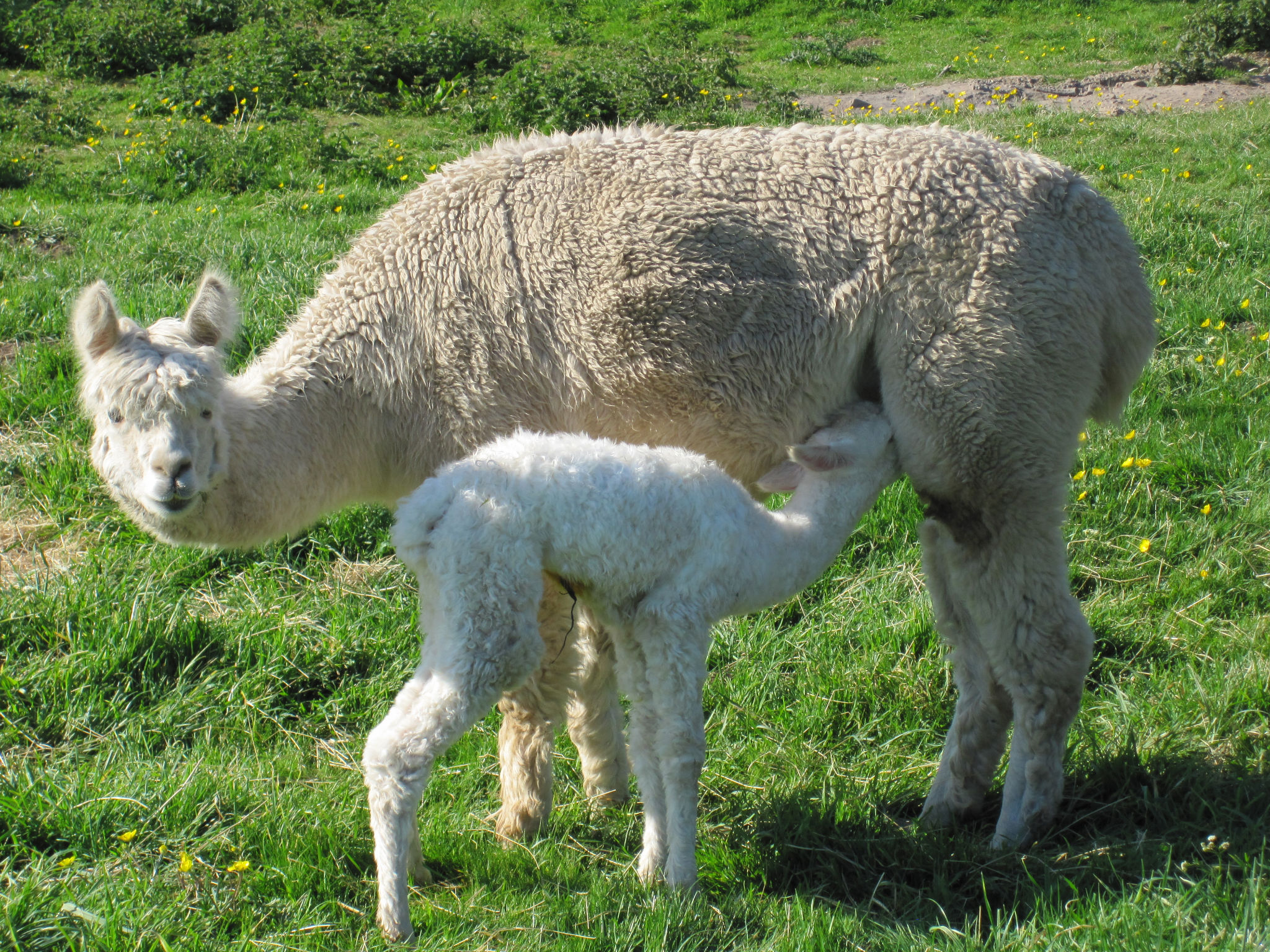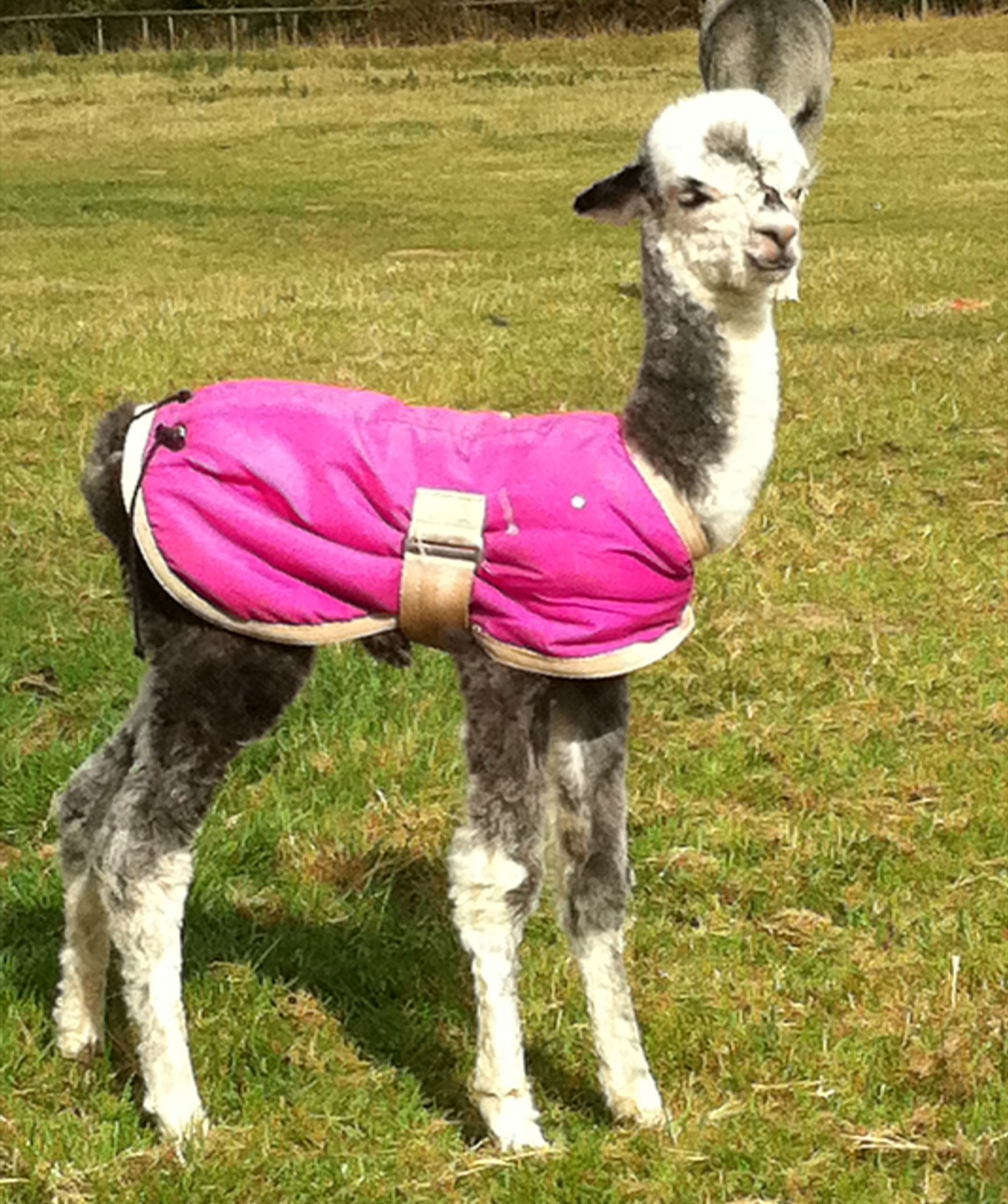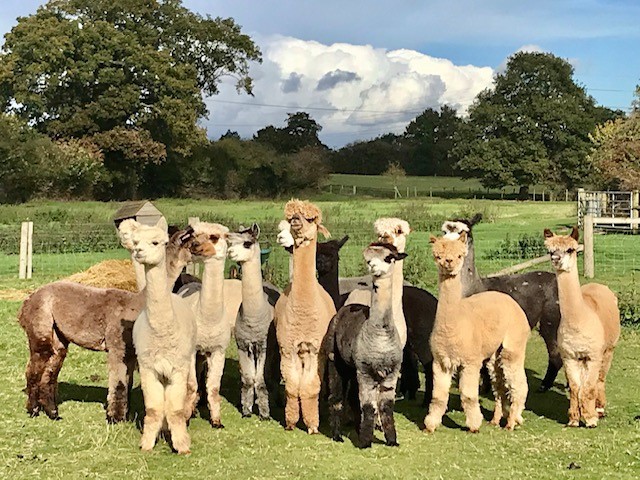Alpaca welfare is extremely important to us at Faerie Tale Alpacas. We offer a full back up service to our clients and a free husbandry course with all alpaca sales.
What is the routine care?
Alpacas are peaceable animals, which do not look for trouble and rarely test fencing however they should be checked at least twice a day, more often if there are young and several times a day if cria are due. Fresh water, hay and specialised alpaca feed should be provided daily. Cria should be registered with The BAS and must be Micro chipped and ear-tagged.
What do they eat?
Alpacas are grazers and have additional hay in the winter. They also have a feed supplement once a day which is essential to help replace the minerals and vitamins that they require and which are absent in British grazing. Alpaca feed is not expensive at around £12 for a 20kilo sack, each animal only requires a handful of feed per day. About 6 – 10 alpacas can be kept per acre depending on the quality of the grass and the time of the year. Fresh drinking water must be available at all times.
Do they need special shelter or fencing?
Alpacas need a field shelter to keep out of driving wind and rain in winter and provide some shade and relief from flies in summer and for sick or premature alpacas. Flies can torment alpacas in the summer; in their homeland they don’t have a fly problem because of the Andean climate. Most alpacas prefer to live out and larger trees and hedgerows provide natural shelter as well as providing a varied diet, however alpacas can get cold and chilled or suffer from heatstroke if shelter is not provided.
Alpacas do not challenge fences and so 4 foot stock fencing is adequate. All barbed wire should be removed as their wool can get tangled in it and they can get trapped. Alpaca fleece is much stronger than sheep’s wool so whilst sheep can pull themselves free if they become entangled, alpacas can get tangled up which can lead to serious injuries.
Do they affect the pasture?
Alpacas are very gentle on the land because they have padded feet and therefore do not churn up the ground. They deposit their droppings in piles in only a few sites and therefore poo picking is easier. Stocking density can be relatively high, at around 5/6 per acre depending on quality of soil, size and type of pasture and drainage of the land. They are very efficient grazers, needing only 60-70% of the acreage required for sheep. They also thrive on poorer grazing, as their stomachs have adapted to work better on a diet high in roughage. They are not hoofed animals, but have soft padded feet with two toenails, so are much less likely to poach their grazing. If possible there should be 2 separate paddocks so the herd can be rotated and the land rested.
Do they get many illnesses?
Alpacas are generally healthy, easy to care for and remarkably disease free. They do need vaccinations against clostridial disease every 6 months. Alpacas should be regularly body-scored on a scale of 1 to 5 with 3 being the optimum - once a month have a careful look at each of your alpacas to assess it’s condition by feeling a position about 4 inches along the spine from the base of the neck. If the spine feels sharp, then the alpaca is underweight the spine should feel comfortably supported by flesh but not submerged or what is called tabletop fat! Toe nails need trimming every few months. Alpacas are not prone to foot rot and fly strike and don't require dipping or dagging.
Alpacas have a strong herding instinct and they know that to be separated from the herd is dangerous for them. They will attempt to mask illness or pain until they can no longer hide it. Act immediately when you find an ill looking alpaca and if in any doubt at all - call your vet. One of the joys of alpaca ownership is simply watching your herd and getting to know each individual. Recognising the normal habits and behaviour of your animals will help you to almost instinctively recognise when something is amiss. An alpaca (not imminently due a cria) which looks off-colour, is behaving strangely, is not with the herd, is lying in the dung hill or is making an unusual noise is sick.
Can alpacas be kept on their own?
Definitely not. Alpacas are sociable herd animals. It would be cruel to keep one in isolation and no reputable breeder will knowingly sell an alpaca to be kept on its own. They should be kept in groups of 3 or more.
Are they good with other animals?
Alpacas are very friendly and can be kept with other animals such as goats, chickens and sheep and in fact provide good protection from foxes for these animals. The adults use a shrill alarm call to alert the herd and the fox, the dominant ones then advance slowly without fuss, the cria behind them. If the fox doesn’t get the message, they have very good acceleration and plenty of speed. They can and do use their teeth, feet, spit, verbal battering and body posturing (head snaking along the ground) against an aggressor. A fox is no match for a mother alpaca! Australians have recorded alpacas protecting sheep by killing dingoes. In the UK alpacas are increasingly being treated as guard animals for sheep and hens. Prince Charles even keeps a couple to guard his organic lambs! If introduced with care, a household’s cats and dogs will be well tolerated by an alpaca herd, my pets are largely ignored by the herd although I always know if a footpath walker has a dog as the herds body posture changes and they are ‘on alert’.
Are alpacas easy to handle?
Alpacas are gentle and non-aggressive to humans and have been domesticated for longer than either cattle or sheep. Commonly they are very gentle and can be halter trained easily especially when young. Alpacas can and do spit but this is usually reserved for settling hierarchical disputes within the herd or as a sign of dominance over other alpacas and at feeding times you may get caught in the cross fire! They also spit if they are very frightened or when provoked e.g. when being vaccinated. Females will also spit at males to show they are pregnant and not at all interested in their attentions! Owners are not usually targets, but may accidentally get in the way and caught in the cross-fire!
Some will kick when being touched on their back legs but if handled when young, they can be desensitised in this area and since their feet are padded the damage from even an accidental kick is minimised, certainly not on a par with a kick from a grumpy horse or cow! Alpacas have only lower teeth which meet on a hard upper pad and rarely bite.
Some alpacas can be flighty and they all require gentle and considerate handling. They are mostly placid, intelligent and inquisitive animals, but with an ability to protect themselves, as can be seen when a fox enters their territory.
A simple 'catch' pen or holding area will make handling your alpacas easy. Placed in one corner of the field or around the field shelter allows animals to be examined and routine care completed. 4 foot high lightweight alpaca hurdles are most suitable and can be easily moved around.
How are alpacas transported?
Alpacas are easy to transport in a livestock trailer or horse box providing they have access to water and a 'comfort break' every few hours. They tend to sit down on the journeys so shouldn’t be tied up.
Are alpacas easy to train?
Alpacas are easy to train. They are generally very intelligent and can be readily trained to accept being led on a halter, getting in and out of a trailer, accepting the handling of their feet for toe-nail trimming, etc.
How often do they need shearing?
Alpacas need shearing once a year although suris are sometimes sheared every 2 years. A sheep shearer would be able to shear an alpaca using electric sheep shears. On average a fleece will weigh about 4kg with around 1-2kg of top quality fleece but some high density stud males have fleece weights much higher than this.
Why are alpacas so popular?
Alpacas are one of the easiest livestock animals to care for and probably the most charming. They are generally gentle and easy to handle, intelligent animals who are quite easy to train.


